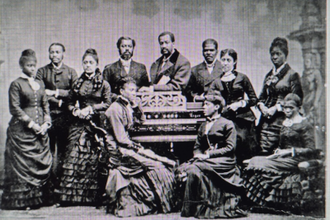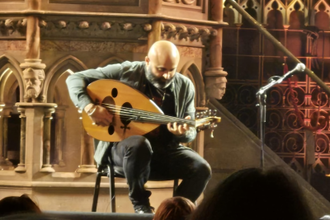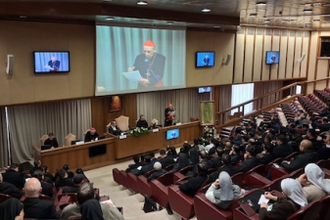Play: Trestle

Gary Lilburn and Connie Walker
Trestle, this year's winner of the Papatango Prize for new writing, is a play for our times: it resonates with an ideal close to Pope Francis's heart - the need for meaningful human encounter.
The characters in this two-hander are Harry, a mid to late sexagenarian widower, and slightly younger Denise, who teaches Zumba. Their encounter occurs in a Temperance Hall in a Yorkshire village.
Both in their way are stunted and require growth, and in a series of twenty vignettes, separated by a blackout and the delightful chaunting of blackbirds, we see them grow together, constantly overcoming and negotiating misunderstandings and disappointments.
An archetypal committee man, conservative, cautious Harry dreams of banging his gavel of authority. At their first meeting, he mistakes Denise for a cleaner. Chastened when corrected, he hurries to assist her stack the chairs. Significantly, as the title of the play suggests, they move closer to each other around a folding table, and around this table, they go on to experience fellowship and companionship, literally breaking the bread from their packed lunches together as their relationship blossoms and deepens.
Playwright Stewart Pringle's writing is exquisite. It trips off the tongue with deceptive ease but it is pitch perfect - as are the pauses and hesitancies - treating us to a rich range of emotions as we the audience gradually get to know the characters as they gradually get to know each other. There is a Racine-like depth in the simplicity and economy of the language.
At the same time, Pringle has a lovely gift for comedy, the highlights of which include the blindfolding and feeding of a startled Denise, whose recent recounting of Fifty Shades of Grey colours her apprehensions of what's afoot; and the appearance of Harry in short, shiny shorts and a too-tight top for Zumba.
Lonely Harry becomes enamoured of lively Denise and has unwelcome revelations to contend with. Denise, too, a liberal with artistic and intellectual leanings, is shocked at the nimbyism and prejudice of Harry's Council - which, it turns out, is actually the local, rather prim-sounding 'improvement committee' - implacably opposed to allowing young offenders to visit the village. The darkening of the narrative is deftly and sensitively done.
Pope Francis, 'the great bridgebuilder', aspires after learning and change through encounter: tearing down the walls and loving the stranger are key messages for today.
Harry, for his part, takes on board Denise's shocked criticism of the committee and ushers in a liberal spring. He tells her that Amnesty International is to be the annual charitable cause. Even while he may have to stomach one revelation too many concerning his relationship with Denise, he has learned, grown and changed through this encounter, and his committee days are done.
In a profound sense, this play examines ageing and the passage of time. In a poignant final twenty-first tableau, Denise (re)dresses the flimsy scarecrow once tended by Harry's late wife - which Harry had neglected and allowed to go naked - with the coat she had worn at their first encounter. The words of Yeats's 'Sailing to Byzantium' came to my mind:
An aged man is but a paltry thing,
A tattered coat upon a stick, unless
Soul clap its hands and sing, and louder sing
For every tatter in its mortal dress.
Harry and Denise were superbly interpreted and performed by Gary Lilburn and Connie Walker and the whole was directed with aplomb by Cathal Cleary.
Trestle ends on 25th November, 3.30pm and 8pm, at the Southwark Playhouse
For more information see: http://southwarkplayhouse.co.uk
Dr Philip Crispin is a lecturer in Drama at the University of Hull


















